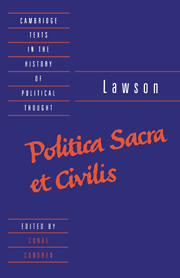Book contents
- Frontmatter
- Contents
- Preface
- Editor's introduction
- A note on the text
- Bibliographical guide
- Biographical notes
- Principal dates
- Politica Sacra et Civilis
- Epistle to the reader
- Dedicatory poem
- The arguments of the several chapters
- 1 Of government in general, and the original thereof
- 2 Of government in general, and of a community civil
- 3 Of an ecclesiastical community
- 4 Of a commonwealth in general, and power civil
- 5 Of the manner how civil power is acquired
- 6 Of power ecclesiastical
- 7 Of the manner of acquiring ecclesiastical power
- 8 Of the disposition of power civil, and the several forms of government
- 9 Of the disposition of ecclesiastical power: and first, whether it be due unto the bishop of Rome
- 10 Whether the civil state have any good title to the Power of the Keys
- 11 Whether episcopacy be the primary subject of the Power of the Keys
- 12 Whether presbytery or presbyters be the primary subject of the Power of the Keys
- 13 That the government of the church is not purely democratical, but like that of a free state, wherein the power is in the whole, not in any part, which is the author's judgement
- 14 Of the extent of a particular church
- 15 Of subjection in general, and the subjects of a civil state
- 16 Of subjects in an ecclesiastical polity
- Index
- Title in the series
12 - Whether presbytery or presbyters be the primary subject of the Power of the Keys
Published online by Cambridge University Press: 05 June 2012
- Frontmatter
- Contents
- Preface
- Editor's introduction
- A note on the text
- Bibliographical guide
- Biographical notes
- Principal dates
- Politica Sacra et Civilis
- Epistle to the reader
- Dedicatory poem
- The arguments of the several chapters
- 1 Of government in general, and the original thereof
- 2 Of government in general, and of a community civil
- 3 Of an ecclesiastical community
- 4 Of a commonwealth in general, and power civil
- 5 Of the manner how civil power is acquired
- 6 Of power ecclesiastical
- 7 Of the manner of acquiring ecclesiastical power
- 8 Of the disposition of power civil, and the several forms of government
- 9 Of the disposition of ecclesiastical power: and first, whether it be due unto the bishop of Rome
- 10 Whether the civil state have any good title to the Power of the Keys
- 11 Whether episcopacy be the primary subject of the Power of the Keys
- 12 Whether presbytery or presbyters be the primary subject of the Power of the Keys
- 13 That the government of the church is not purely democratical, but like that of a free state, wherein the power is in the whole, not in any part, which is the author's judgement
- 14 Of the extent of a particular church
- 15 Of subjection in general, and the subjects of a civil state
- 16 Of subjects in an ecclesiastical polity
- Index
- Title in the series
Summary
In divers parts of Europe, where episcopacy hath been abolished, presbytery did succeed: and that (as it is asserted by many) upon such grounds, as will prove it as pure an aristocracy, as that of episcopacy was. The parties indeed have been changed, and instead of bishops we have presbyters: and though the former imparity be taken away, yet the form of government, which is aristocratic, remains. I have formerly heard many complain, that the bishops had cast off the presbyters: and now some do not like it well, that the presbyters have cast off the bishops, yet both do seem to agree to exclude the people, as distinct from the clergy, engrossing the whole power to themselves. These pure aristocratic forms have for the most part proved dangerous, especially in the church, because they do so much incline unto oligarchy, and usually degenerate into the same.
But to observe some order; I will [first] examine what these presbyters are; [second] whether these being known, can according to Christ's institution be the primary subject of this power; [and] add something concerning our English presbytery. […] These presbyters are of two sorts, […] some are preaching, [and] some are not preaching, but only ruling presbyters or elders. The former are trusted with the dispensation of the word and sacraments, the latter are not. Both have the same name and are elders, yet differ much in respect of their ecclesiastical being.
- Type
- Chapter
- Information
- Lawson: Politica sacra et civilis , pp. 152 - 163Publisher: Cambridge University PressPrint publication year: 1993



